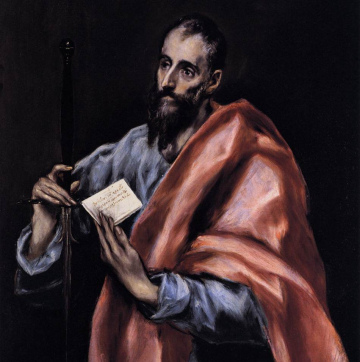Paul can rightfully be called an apostle because he fulfilled the same three basic requirements the specially selected twelve disciples met. After the death of Judas, the church (totaling about 120) met in Jerusalem to decide who among them would be uniquely qualified to replace him (Acts 1).
Generally, those to be considered for the awesome responsibility of an apostle had to have been personally called by Christ, taught by him directly for several years (as Paul would be), and seen him alive after his resurrection (Acts 1:17, 22, 25).
Background
Saul of Tarsus was initially a zealous persecutor of those who believed Christ was the Messiah (Acts 9). While traveling to Damascus in 33 A.D., three years after Jesus was resurrected, he was miraculously confronted by the Lord and brought to repentance (verses 3 to 6). While he stayed in Damascus, a believer named Ananias received a vision that revealed why Saul was called and chosen to take on a special responsibility.

But the Lord said to him (Ananias), "Go, for this man is a chosen vessel to Me, to bear My name before the Gentiles, and kings, and the children of Israel; For I will show him what great things he must suffer for My name" (Acts 9:15 - 16, HBFV throughout).
After Paul was baptized in Damascus he began to powerful preach that Christ was the Son of God (Acts 9:20 - 22). Death threats from Jews living in the city, who rejected his message, drove him to flee to Arabia. During his three years of exile in Arabia he was personally taught by Jesus.
But I (Paul) certify to you, brethren, that the gospel that was preached by me is not according to man; Because neither did I receive it from man, nor was I taught it by man; rather, it was by the revelation of Jesus Christ . . .
But when it pleased God, Who selected me from my mother’s womb, and called me by His grace, to reveal His own Son in me, in order that I might preach Him as the gospel among the Gentiles, I did not immediately confer with flesh and blood,
Nor did I go up to Jerusalem to those who were apostles before me; but I went away into Arabia, and returned again to Damascus (Galatians 1:11 - 12, 15 - 17, HBFV, see also Acts 9:20 - 25).
Paul, at this point in his life, fulfilled the same basic criteria the original disciples did in regard to being considered an apostle.
Paul's Unique Calling
Additional Biblical evidence exists that shows, and reaffirms, his calling as being unique. In Acts 13 the church in Syrian Antioch is told by God to "separate both Barnabas and Saul to Me for the work to which I have called them" (Acts 13:2). The church soon lays hands on the two men and sends them out to evangelize (verses 3 - 4). After this event Luke, the writer of the book of Acts, labels both men as apostles (Acts 14:14).
Paul himself, in many of his writings, asserts his right to his special calling (1Corinthians 1:1, 2Corinthians 11:5, Galatians 1:1, Colossians 1:1, 1Timothy 1:1, etc.).He writes the following defending his unique calling to the churches in the Roman province of Galatia.
Paul, an apostle, not sent from men nor made by man, but by Jesus Christ and God the Father . . . But I certify to you, brethren, that the gospel that was preached by me is not according to man; Because neither did I receive it from man, nor was I taught it by man; rather, it was by the revelation of Jesus Christ . . . (Galatians 1:11 - 12).
Flexible Requirements
The Greek word apostolos (Strong's Concordance #G652) is used eighty-one times in the original language of the New Testament. The word, which many times in the King James is translated as "apostle" or its plural, simply means "a delegate, an ambassador of the gospel, or one that is sent." Surprisingly, the Bible does not limit the use of this term to Jesus' innermost twelve followers or even to Paul.
As stated previously, Barnabas was also given this designation by Luke.
But when the apostles, Barnabas and Paul, heard this, they ripped their own garments in disbelief, and rushed into the multitude, shouting out . . . (Acts 14:14, HBFV).
Paul, defending himself against those critical of his ministry, asserts to the Corinthians that both he and Barnabas have the same right to be financially supported as the other apostles (1Corinthians 9). Barnabas was considered "one sent" by God to preach the gospel even though Scripture does not state he was personally taught by Christ or saw him after his resurrection.
Others?
Biblical evidence suggests Apollos (1Corinthian 4:6, 9), Silvanus and Timothy (1Thessalonians 1:1, 2:6), as well as Andronicus (a possible distant relative of Paul's) and a person named Junia were also apostles (Romans 16:7). Paul referred to James, the Lord's physical half-brother, as also possessing this calling.
But other of the apostles saw I none, save James the Lord's brother. (Galatians 1:19).